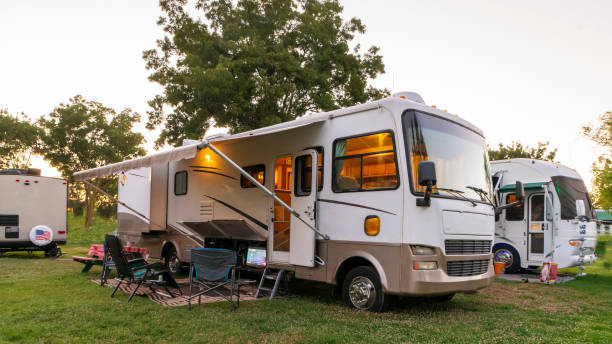1. Can you live in an RV full-time?
Yes! You absolutely can live in an RV full-time with pets and/or children in tow! Living in an RV year-round is an incredible learning experience, from finding ways to stay connected via WiFi, figuring out how to best stay connected to power, dealing with breakdowns while still managing work, school, to taking care of your four-legged family members. All these experiences are just part of daily life as someone who lives their dream every day by living in an RV!
2. How do you live in an RV full-time, and what is living in a camper like?
The simple answer, you just do it! Living in a camper full-time may seem odd to many. Still, for the most part, space-wise, living in an RV full-time is really not that different from living in a small apartment. (But this apartment rolls and can come along with you on all of your adventures!) Life is different in an RV. No matter how much manufacturers make them look like brick and mortar homes, they come with their own set of unique limitations different from ones in a house – including heating, cooling, and electrical quirks. If you are new to RVs, there’s going to be a bit of a learning curve.
3. Why are you living in an RV full-time?
Living on the go while exploring new places around America always sounds like such an incredible adventure.
4. What is involved when downsizing to live in an RV full-time?
We suggest tackling this process room by room and placing everything into four piles: Sell, Return, Store, and Donate.
5. How do you prepare for living in an RV full-time?
Reading books and blogs like this will help with getting as prepared as possible. Also, it is easier now to do practice runs with rental options expanding all the time. Practice runs are a good way to learn some basics, like knowing when to refill the propane tanks and a few shore power best practices. Keep in mind it gets easier as you go, so if you feel intimidated by that first rental, don’t let it stop you from trying it several times.
6. Do you need to know how to work on RVs to live in one?
The short answer is no. Much like cars and homes, you can find mechanics. The longer answer, though, is they’re not always as easy to find. And if you’re going to rely on mechanics, you definitely need to make sure you’ve accounted for that in your budget. Constantly taking an RV down the road takes a toll on them. It’s super important to get comfortable with the concept that they are fragile. They are not built like a home. That way, when things start falling apart, you won’t stress as much as if you were unprepared. Still, it definitely doesn’t hurt to know some basics, or at least go into the mindset of figuring you’re going to learn along the way. Things breaking is 100% part of the lifestyle. The sooner you realize that, the sooner you’ll start enjoying the journey more.
7. How did you choose where to establish your domicile while full-time RVing?
If you’re wondering what a domicile is, it’s known as the spot you “intend to call home.” This will be the state your driver’s license is registered in, where you vote, where your health insurance will be based and more than likely cover you, where your vehicle is registered, and the state you file taxes. The three most popular states for full-timers to pick as their domicile are: Texas, South Dakota, and Florida. This is because those states offer superior financial savings options. (It should be noted, financial savings should not be the only reason you pick a specific state as your domicile. If you’re trying to decide where it would be best for you to be domiciled as an RVer, you must think about where you see yourself returning to regularly.)
8. If you live in an RV, what is your address?
There are multiple companies out there that can help you out with this. We recommend Escapees.
9. How do you get mail to the RV?
Try to get as much of your mail digitally as possible. This will help make sure you don’t miss important deadlines. As for packages, attempt to deliver those to the appropriate campground/RV park on the right day. Or, if the place you are staying doesn’t allow mail, then to the closest Post Office as a General Delivery package.
10. Where do you stay?
RV Parks: The most amenities, the most expensive.
If you’re looking for luxury, check out RV parks. These destinations are generally aimed at those who would prefer to make their camping stay as comfortable and easy-going as possible. With amenities such as basketball courts, ice cream stands, and a hot tub to soak in at the end of your long day’s adventures, these parks provide many activities that will keep everyone entertained! Two popular examples are KOA and Jellystone Park.
Campgrounds: fewer amenities, often more beautiful and secluded, also usually cheaper.
These spots are the best when you want the vast natural world to surround you and nothing but peace and quiet while disconnecting entirely within nature. However, living “rough” in a campground with your RV means you don’t have to completely rough it! If seeing some animals is what you’re looking for, then campgrounds can be the best option. These spots rarely come with anything in the way of amenities. Furthermore, national park campsites are highly coveted because they are in the heart of the action and tend to be the most peaceful.
Boondocking: Free camping on public lands! There are no amenities or hookups.
These spots are found in national and state parks, national and state forests, wilderness areas, and on BLM land. Campendium and the Ultimate CG app are helpful resources for this method of camping.

